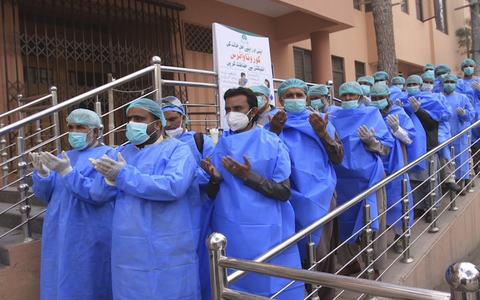ISLAMABAD / KARACHI / QUETTA: As ulema of different sects failed to reach a consensus on the decree issued by Al Azhar to suspend Friday prayers and daily congregations at mosques to contain the coronavirus outbreak, the Sindh and Balochistan governments banned congregational prayers at mosques.
At a video conference with President Dr Arif Alvi on Thursday, prominent clerics belonging to Hanafi school of thought downplayed the Al Azhar decree, but the representatives of Shia and Ahle Hadith schools of thought supported suspension of congregational prayers.
Meanwhile, the Sindh government announced suspension of congregational prayers at mosques, including Friday congregations, to maintain social distancing to arrest the spread of coronavirus.
Adviser to the Sindh chief minister Barrister Muratza Wahab said the government had made the decision after consultation with clerics of all schools of thought. “Major decision by the Sindh government. To contain spread of coronavirus, people can no more offer prayers at mosques,” he tweeted. “Only staff of mosques of maximum five people can offer prayers at mosques.”
Ulema divided over suspension of congregational prayers to contain coronavirus outbreak
The provincial information ministry said the ban on congregational prayers at mosques would remain in place till April 5.
In Quetta, a late-night notification issued by the home and tribal affairs department said the Balochistan government had banned Friday prayers across the province at mosques with immediate effect.
Mosques will remain open but only five people could perform the prayers, including the prayer leader and four others. It further said that people would perform all prayers at their homes.
During the Islamabad video conference, the president discussed with the ulema the situation arising out of the Covid-19 pandemic and asked them to advise the people to stay indoors and offer prayers in their homes to help in containing the spread of the disease.
The concept is based on the decree received from Al Azhar, a Cairo-based institution widely seen as an authority on Islamic injunctions, that people can offer farz prayers at their houses, instead of mosques, in the wake of the coronavirus pandemic.
President Alvi highlighted the preventive measures needed to be taken by people to stop spread of Covid-19 and emphasised that the only solution to this crisis was to maintain social distancing and follow the guidelines provided by Islam to cope with such a situation.
However, contrary to the expectations of the authorities, a majority of ulema of Barelvi and Deobandi schools of thought did not agree to the suggestion and even contradicted the official statement which said: “The ulema assured their complete support and said that they would comply with the instructions given by the Government.”
Mufti Muneeb-ur-Rehman, Chairman of the Ruet-i-Hilal Commitee and the head of board for madressahs of Barelvi school of thought, said: “The impression about the outcome of meeting with President Alvi is wrong. We did not agree with the fatwa issued by Al Azhar.
Similar opinion was expressed by Qari Hanif Jalandhari, head of Wafaqul Madaris Al Arabia, the board of seminaries of Deobandi school of thought, who asked the government to share the copy of the original ‘edict’ issued by Al Azhar.
Mufti Taqi Usmani, another senior cleric of Deobandi school of thought, did not arrive at Governor House, Karachi, to attend the video conference.
On the other hand, the Ahle Hadith group, represented by Senator Professor Sajid Mir, leader of Markazi Jamiat Ahle Hadith who attended the video conference from Governor House, Lahore, and various Shia clerics -- including Allama Ameen Shaheedi and Allama Arif Wahidi, in Islamabad, Allama Shehanshah Naqvi from Karachi and others from Lahore and Quetta — unanimously supported the proposal of suspending all gathering in mosques, including regular and Friday prayers.
Prof Mir said: “Fasting in Ramazan is farz for all Muslims, but it can be suspended on doctor’s advice. Now this step too is being taken on doctors’ advice.”
It was eventually agreed by the Barelvi and Deobandi ulema that precautionary steps would be taken and prayer leaders would discourage massive gatherings and shorten the sermons, children and elderly would be asked to pray at home and anybody suffering from allergies, flu etc would be asked not to come to the mosque.
Talking to the media, Minister for Religious Affairs Pir Noorul Haq Qadri said: “We are not going for a complete ban on all gatherings including daily prayers, but it is essential to note what is important: jamaat or namazi,”. The minister said that saving human lives was farz.
Published in Dawn, March 27th, 2020















































